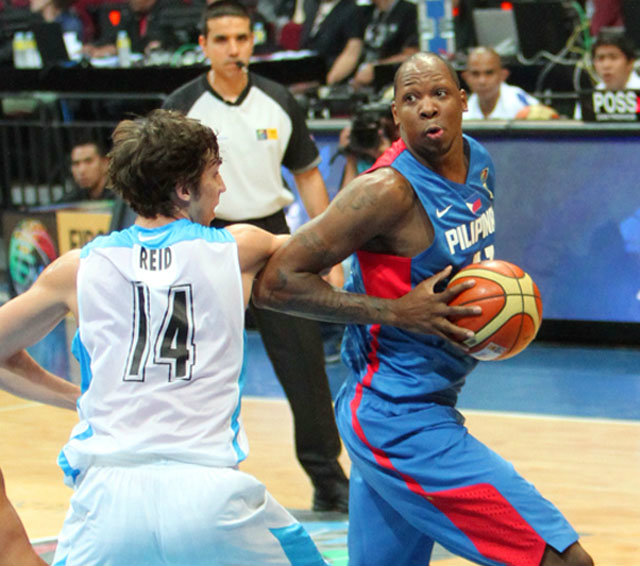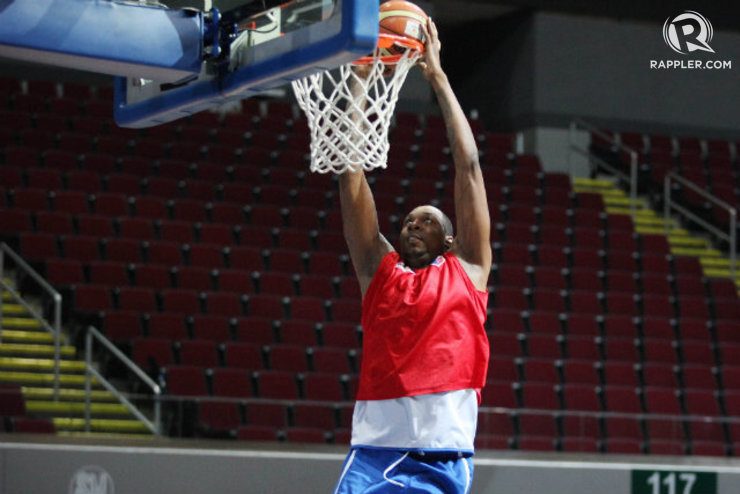SUMMARY
This is AI generated summarization, which may have errors. For context, always refer to the full article.

MANILA, Philippines – The loss that Gilas Pilipinas suffered against unheralded Qatar in their Asian Games quarterfinal match on Friday can best be described as humbling. Less than 24 hours after their disappointing defeat to Iran, the team that has bedeviled the Philippines in four straight meetings, Gilas was expected to correct their path and gain much needed confidence in a winnable game.
Qatar, which is rated 16 spots below Gilas in the FIBA rankings at 47, had won their two previous games in the tournament. But this was the same team which Gilas defeated by ten points at the 2013 FIBA Asia Championship despite losing naturalized center Marcus Douthit to injury late in the game. How could we lose?
But after 40 minutes of game time had elapsed, it was Qatar which exalted in celebration, boasting the better side of a 77-68 score.
Yet as sad as that outcome was, what transpired moments later in the press room was even more disheartening.
Gilas coach Vincent “Chot” Reyes, the only 5-time Philippine Basketball Association Coach of the Year, placed the blame squarely on Douthit, burying him in the most egregious of manners that could possibly be conceived.
“He quit on us,” Reyes said bluntly. “I don’t think it was an issue of fatigue. I think it was more of an issue of desire.” Quitting is the antithesis of “puso,” the rallying cry which has become synonymous with the underdog squad.
Reyes upped the ante, suggesting that his displeasure was shared by the entire team. “All of us are disappointed at Marcus.”
Reyes says that Douthit’s body language coming out for the second half was “very bad,” and that he was last to leave the locker room because he was watching a music video.
Now, I’m no basketball coach. Aside from playing a bit of junior varsity ball in my sophomore year of high school and watching my father Jaime Songalia coach in the Filipino league in Jersey City, N.J., my experience with basketball has been as a fan and reporter.
But there’s a saying in sports, one that is supposed to unite a group of non-blood related people into a brotherhood with the solitary goal of achieving victory: “You win as a team, and you lose as a team.”
The Qatar game was far from Douthit’s brightest performance. In 24 minutes, the 6-foot-10 Syracuse, N.Y. native scored 10 points on 4-8 shooting while grabbing just 5 rebounds.
He was constantly beaten to the rim by Qatar’s quicker players and had trouble getting open for inlet passes.
A stronger performance might’ve been the difference between a comfortable 1-0 cushion in the round robin quarters and facing the do-or-die situation we find ourselves in against South Korea and Kazakhstan on Saturday and Sunday.
But it doesn’t erase the three years of goodwill that Douthit has built up since assuming Filipino citizenship in 2011 to join the national team of a country which he shares no ethnic connection with.
Since joining the Philippine team before the FIBA Asia Championship, Gilas has steadily marched up the rankings to the number 31 spot which they currently occupy.
Through it all, Douthit has been the portrait of a team player. Despite playing through injuries to help Gilas finish second in the 2013 FIBA Asia Championship and earn its first trip to the World Cup in 36 years, he was replaced by NBA veteran Andray Blatche as the team’s naturalized player.
“Anything that makes the program better, I’m all for it,” said Douthit, who averaged 21.9 PPG and 12.2 RPG when Gilas placed fourth at 2011 FIBA Asia and 11.9 and 9.4 at the 2013 edition. (RELATED: Douthit grateful for Gilas stint, ready to pass the torch)
Gilas backup center June Mar Fajardo has credited Douthit with helping develop his game, which bodes well for the future of the country’s basketball program. When the 34-year-old Douthit retires, he’ll likely continue with the national team as a big man skills coach.

The most hurtful statement that Reyes made after the game would create a divide between a team and a player that will be very difficult to mend.
“I’m gonna ask Marcus if he doesn’t wanna play, we’ll go all-Filipino.”
The implication there is that Douthit, who despite earning the nickname “Kuya Marcus” for his bayanihan spirit, and who can recite the Philippine national anthem Lupang Hinirang better than many Filipino-Americans, isn’t a Filipino.
While Douthit may not have an ounce of Filipino blood in him, he still plays for the flag that every Filipino holds dear to him. He has left his family and culture behind to stand side by side with his new brothers to fight against hope to bring the nation’s favorite sport to respectable levels.
Douthit deserves better than to be criticized publicly and invited to go home for one bad game. He can’t be Kuya Marcus when we win, and not a true Filipino when we lose.
The attitude reflected by those statements isn’t too far from how many view the interchangeable imports which bolster the PBA rosters for two conferences a season. An import can score 40 points one night, have an off-game the next and be sent home before his jetlag wears off.
Expectations of foreign-born ringers are rooted in the performances of players like Billy Ray Bates, known as the “Black Superman” for his amazing athletic feats with the Crispa and Ginebra teams of the 80s, and Tony Harris, the Swift import who lit up an Iloilo City gymnasium for 105 points in 1992.
The double-standard was clear after Thursday’s loss to Iran. After the game, it wasn’t Jeff Chan, who shot just 1-5 from three-point range, or Fajardo, who turned the ball over 5 times in 14 minutes, who were targeted for criticism.
It was Douthit, who found himself wide open after a screen-and-roll with Chan and missed a game-tying three pointer with less than 10 seconds remaining.
“Douthit shouldn’t have shot that three, he should have waiting for better shot,” Reyes was quoted as saying after Douthit registered 10 points, 10 rebounds and 4 blocks.
A day after the Qatar defeat, the Philippine team will have to face Korea, a team which held a “Curse” over the Philippines for decades before being cracked last year. Then the following day Gilas will have to play Kazakhstan, whom they blew out by 30 last year, in back-to-back games Gilas will have to win to have a chance to advance to the semis.
Unless the team patches matters up quickly, Douthit and his teammates will enter the court with the fabric of their bond in question. “You dance with the one who brought you here,” as another popular axiom goes, and Douthit is the only naturalized player Gilas has in Incheon.
The team must stand as a united front with its players, just as it does with its coaches. Every member of an organization must show trust and faith in its players and Coach Reyes, regardless of what outside detractors say.
Whether Gilas Pilipinas lives up to their lofty expectations at the Asian Games, or whether the nation once again has its threshold for heartbreak tested, remember these words which came from the mouth of Marcus Eugene Douthit.
“I’ll never have Filipino blood, but as far as becoming a Filipino, I’ll always have it in my heart.” – Rappler.com
Related Stories:
Add a comment
How does this make you feel?
There are no comments yet. Add your comment to start the conversation.